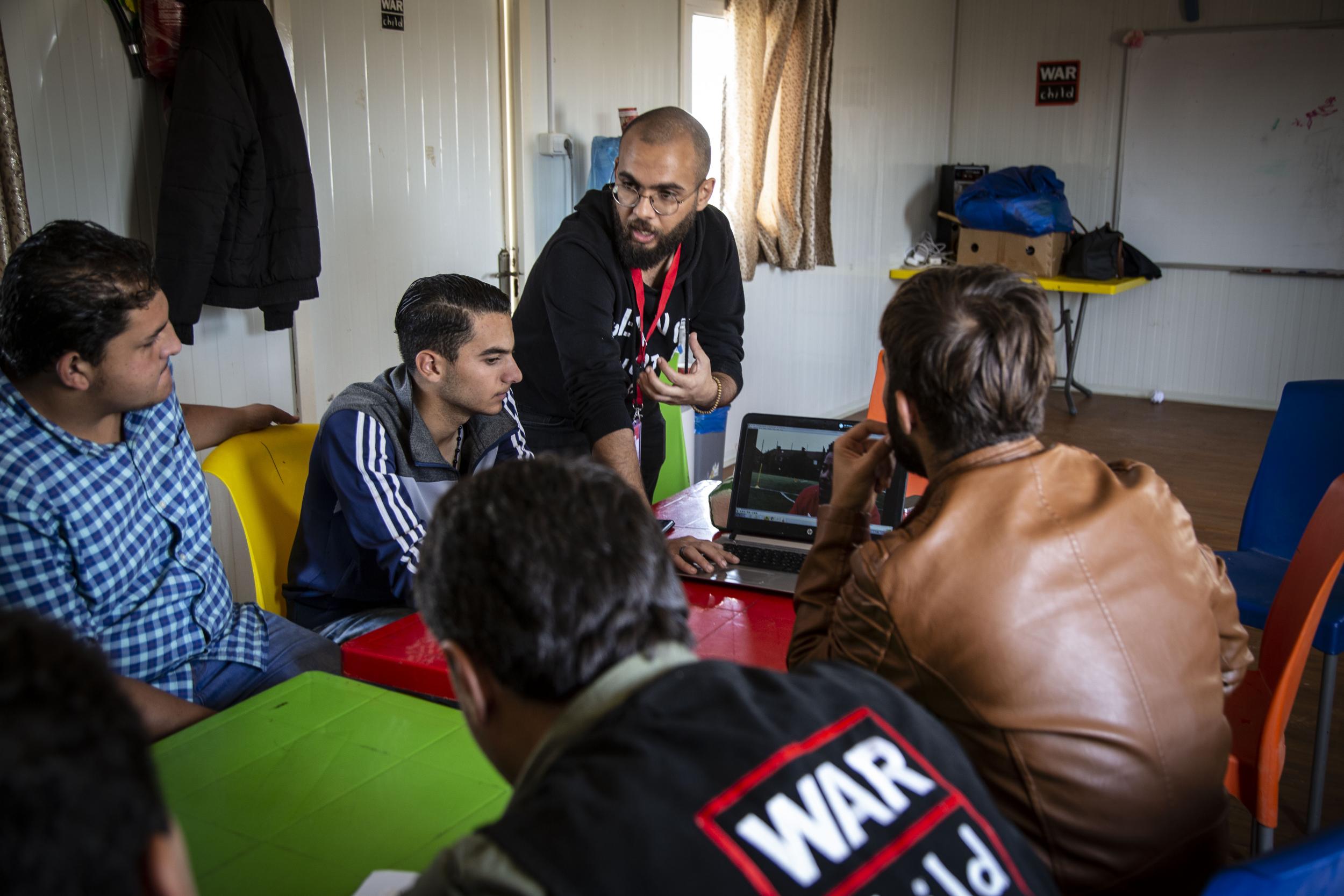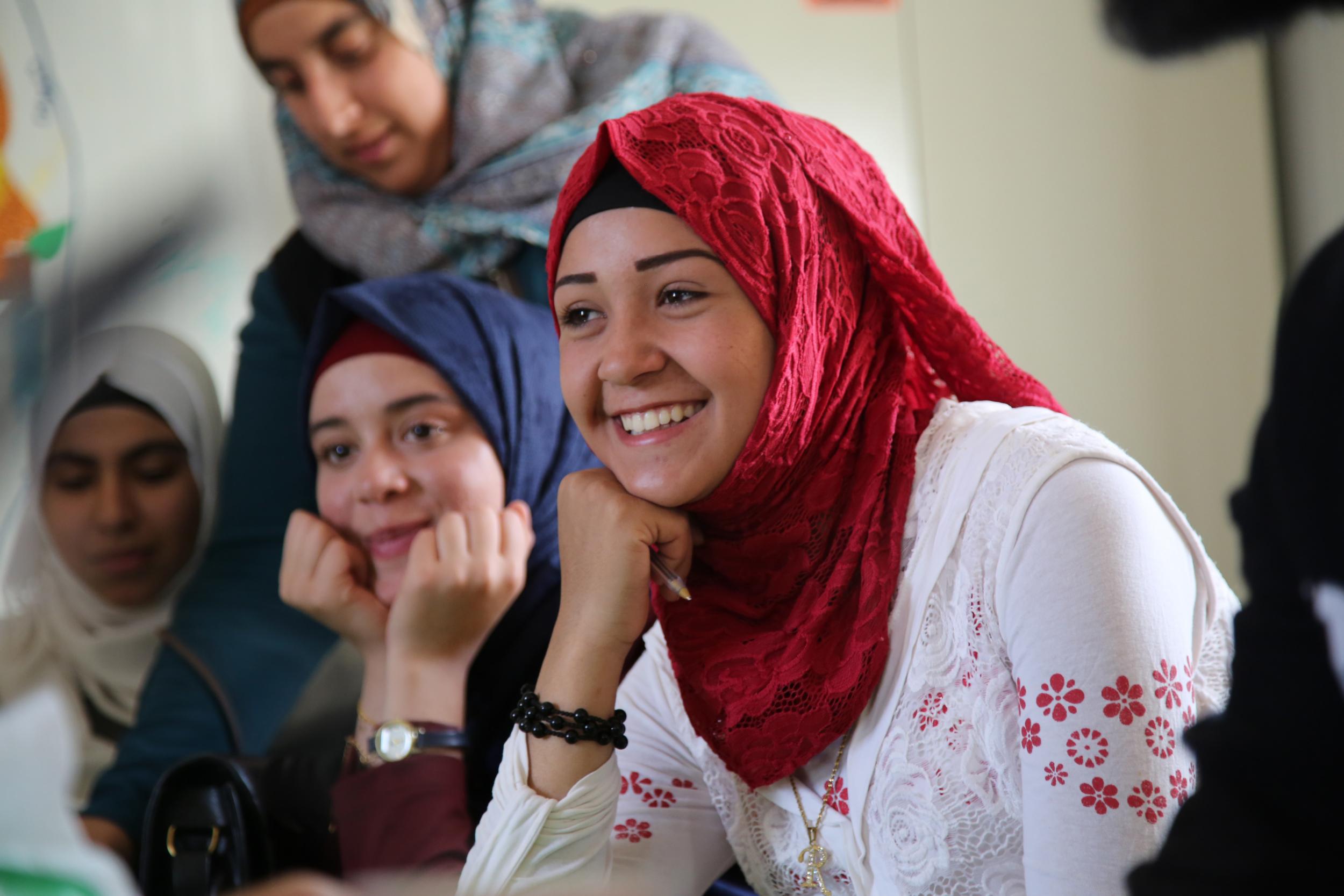Learn to Live: Sharing my story with Londoners has inspired me to tell the world, says Syrian refugee
Hanin, a Syrian refugee in Jordan, says she is inspired to become a journalist after telling her story to London schoolgirls
Your support helps us to tell the story
From reproductive rights to climate change to Big Tech, The Independent is on the ground when the story is developing. Whether it's investigating the financials of Elon Musk's pro-Trump PAC or producing our latest documentary, 'The A Word', which shines a light on the American women fighting for reproductive rights, we know how important it is to parse out the facts from the messaging.
At such a critical moment in US history, we need reporters on the ground. Your donation allows us to keep sending journalists to speak to both sides of the story.
The Independent is trusted by Americans across the entire political spectrum. And unlike many other quality news outlets, we choose not to lock Americans out of our reporting and analysis with paywalls. We believe quality journalism should be available to everyone, paid for by those who can afford it.
Your support makes all the difference.It is hard to imagine that the eloquent schoolgirl talking a packed room through her anti-child-marriage campaign was just a few years ago so shaken by the war she fled that she could barely speak.
But Hanin, 16, a refugee who escaped Syria for Zaatari camp in Jordan, has set her sights on becoming a foreign correspondent to “challenge stereotypes” about her country, which has been ravaged by a seven-year conflict.
The smiling teenager credits psychosocial support and advocacy programmes run by War Child with her emotional change.
But the main driver behind her career choice has been the past two months when she had her first taste of international journalism.
Through a twinning programme run by The Independent and War Child, Hanin said she was able to communicate the story of her life and the challenges she and her peers face with an unlikely foreign audience: Hornsey School for Girls in north London
Since the summer, the girls from Zaatari and their peers in the UK have been sharing stories, discussing inspirational women and carrying out art projects together.
Hornsey is one of the British schools that took part in the Learn to Live campaign, which paired children who have lived through conflict with their British counterparts to bring about change.
“It has inspired me to change and challenge stereotypes, to make a better kind of journalism,” Hanin tells The Independent from the War Child school room in the heart of Zaatari, which is home to 80,000 people.
There, inside the centre built out of metal sheeting and dotted with colourful drawings, Hanin has taken part in War Child’s VoiceMore advocacy programme, which offers a space for young people to identify and tackle the problems they face.
It is through VoiceMore that the girls ran surveys in the camp and identified child labour and early marriage as two main issues the youth face.
But it was The Independent‘s twinning scheme and the reaction she saw in London resulting from it that Hanin realised the impact telling these stories to the outside world might have.
“We were surprised and happy they were interested,” she says, her face lighting up. “When I’m carrying a camera, I feel like I am carrying my value. I love writing articles. I have learnt the idea of not being afraid to speak out to tell the truth.
“Without the psychological support I would have been at home. I wouldn’t have risked going outside or mingling with people. I am an introvert, but people here gave me support so I slowly crawled out of my shell.”
The five other girls in the room all agree with Hanin about the impact of the programmes.
They discuss the testimonies they have gathered from the camp as part of VoiceMore, including a 15-year-old boy who lost his part of his hand in a meat grinder where he worked in a butcher’s shop. As they speak three boys, no older than eight years old, cycle past, bent double under huge bags of grain: a telling sign.
Rula, 16, talks about a friend of hers who was married off and had a baby at just 15 years old in Zaatari. “She just couldn’t click to the fact that she was a mother to the baby when she herself was a still a child,” Rula says.
“The only way we can work on these problems is to identify them in the first place. And in some cases we’ve made big changes, there is now security outside our schools to stop harassment, for example,” she adds.
The girls say the programmes have helped them deal with living in a refugee camp for so many years. It is unlikely that any of them will go home to war-ravaged Deraa, south Syria, anytime soon: many of their brothers are now of military conscription age. Conditions in Zaatari, meanwhile, are getting worse. As the Syrian civil war has ground on, donor fatigue has seen aid funding dry up – Jordan, home to over 1.3 million Syrian refugees, is struggling to cope.

The girls talk in worried tones about how Unicef was forced to let hundreds of the camp’s teachers go earlier this year. War Child staffers say that most people believe that as the worst of the war appears to be over, everything is fine, but long-term support is still vital for these vulnerable children.
But the conversation then veers towards the more positive: their hopes for their future, which includes everything from launching tech startups to helping support their war-wounded fathers to running for political office. They speak with a maturity startling for a group so young. Haya, 16, who was chosen to speak at a child-led discussion on human rights at the UN headquarters in Geneva in September, says she wants to be Syria’s first female president.
She is now so convinced by VoiceMore and the psychosocial support programme that she thinks it should be an integral part of the school curriculum in the UK. She was shocked that the Hornsey girls shared so many similar concerns, such as the street harassment they themselves had been tackling this month.
“I think psychosocial support is essential for everyone whenever they are in a weak spot,” she says.
I think psychosocial support is essential for everyone
Dina, 15, agreed. “I think what surprised us the most about this whole experience is realising how similar the girls in London are to us,” she says.
Outside the school room the boys from the camp, who are twinned with pupils at Carshalton Boys Sports College in Sutton, say they were also shocked to learn that despite what they thought was the comparative privilege of London there are still problems like poverty, school drop-out rates and gang violence.
As the conversation becomes too serious Mohammed, 17, an enthusiastic keyboard player and the joker of the group, interjects to lighten the tone. “The most surprising thing for me is why the boys are always dressed like they are attending a wedding,” he says, pointing to one of the Carshalton pupils who is dressed in suit uniform, which is not common in Syria. “He looks like a groom,” he adds.

But again the boys also agree that the Londoners would benefit from the programmes they have been through. They say it should be compulsory for all children and their parents who are struggling.
However, War Child employees fear that emotional support for displaced children and their parents is not considered part of emergency responses to conflict. But without it, there can be devastating consequences, potentially causing domestic violence in the future.
Hussein Amoudi, of War Child in Jordan, called psychosocial support a “life-saving skill”.
“I would echo what the children said: everyone needs psychosocial support to deal with the individual challenges they face ... no matter what they have been through,” he added.
That is why, since September, The Independent and the Evening Standard have teamed up with War Child to link British schools with children like these refugees in Jordan to lobby for a sea-change in attitudes to vital emotional support systems.

Join our commenting forum
Join thought-provoking conversations, follow other Independent readers and see their replies
Comments